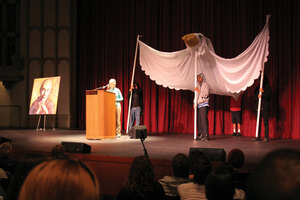Jane Goodall offers audience words of advice
An hour before the lecture was scheduled to start Tuesday, students and faculty were already lined up in front of Bovard Auditorium, pushing to get a good seat. When the doors finally opened, they filed in and waited to hear Jane Goodall speak about her work.
An internationally recognized primatologist, ethologist and anthropologist, Goodall has won several awards including the Medal of Tanzania, the Hubbard Medal and the Gandhi-King Award. She came to USC to give a lecture on her studies of chimps overseas, her investigation of how the environment affects animals and humans and the impact individuals can have.

Taking wing · A peace dove with a 20-foot wingspan was displayed on the stage during Jane Goodall’s speech at Bovard Auditorium Tuesday to reinforce her message of nonviolent conflict resolution. Goodall is the recipient of a Gandhi-King Award. - Dieuwertje Kast | Daily Trojan
A key point, Goodall said, is that humans need to think every day about their effects on the environment.
“Humans are not as different as we used to think from the rest of the animal kingdom,” Goodall said. “The only difference is that we have a sophisticated language … so it’s led to the explosive development of the human intellect. Therefore, how come the most intellectual species that has ever walked the planet is destroying it? Is there a disconnect between the clever head and the human heart?”
Goodall has been an adjunct professor at USC for 19 years, giving a lecture every three years to update USC on her work and to push students to take an active role in positively impacting the environment.
“I’m really inspired by Jane Goodall as a pioneer in anthropology, but also as a great activist for change, academia, change in our world consciousness, evolution, how we fit into this world and the respect we need to bring to animals and other forms of life,” said Antonia Blumberg, a sophomore majoring in anthropology who attended the speech.
Goodall was also instrumental in founding the Jane Goodall Research Center at USC. The center sends USC graduate students to conduct research on the behavior of wild apes and other primates, and also stores data from the Gombe Research Center, according to Craig Stanford, co-director of the center.
With the founding of the research center in 1991, Goodall agreed to give regular speeches on campus, which is what brought her to Bovard Tuesday.
Goodall began her lecture by imitating a greeting that chimpanzees would normally give in Gombe, eliciting a round of applause from the audience. She continued by updating the audience on the work done in Gombe and reflected on her dream to study animals in Africa.
“I was the wrong sex. I was a mere girl, and girls didn’t do that sort of thing … I never heard from my family, a single word suggesting that I might not be able to achieve my dream,” Goodall said to the audience. “My mother would always say to me and my sister that if you really want something and you work hard and you take advantage of opportunity and you never give up, you will find a way.”
Both the students and faculty in attendance said they enjoyed Goodall’s lecture and praised both her delivery and her content. At the end of her speech, the audience gave her a standing ovation.
“It was really inspiring because at times it feels like there’s no way, that it’s impossible to fix what we’ve messed with, but after listening to her, each of us can make a difference and if each of us makes an effort, [then] we’ll have a huge impact on everyone,” said Brittany Davis, a freshman majoring in broadcast journalism. “She was so well-spoken, and everything was ordered in the way she wanted to say it to us … This woman has lived such an amazing and inspirational life.”
Blumberg agreed.
“I feel like I was being changed, just by listening to her and meeting her,” she said. “Her talk was one of the most important things that people our age can be hearing.”
Stanford said he was pleased with the outcome and thought Goodall’s lecture made an impact on the audience.
“The audience was 100 percent receptive to her message. They wanted inspiration and they got it,” Stanford said.
